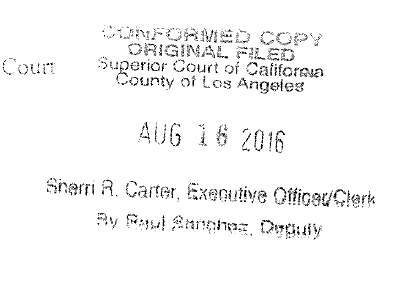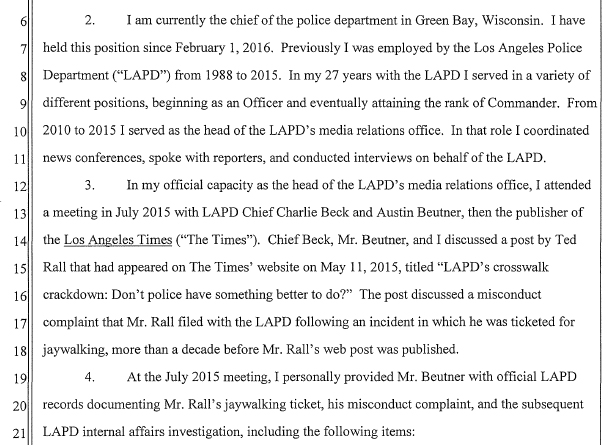
If you live in or near Los Angeles and you have Friday mornings off, here’s a Save the Date: LA Superior Court, 111 North Hill Street, downtown LA. Take the elevator up to the 7th floor, to Department 74. Friday, July 14, 2017 at 9 am: be there or be square.
I’ll be defending myself against The Los Angeles Times, which colluded with LAPD Chief Charlie Beck to fire me two years ago. Personally. Pro se.
I’ll be acting as my own lawyer.
My crime? For six years my cartoons in the Times criticized the police in general, the LAPD in particular and Chief Beck personally because of his department’s deplorable history of brutalizing civilians and murdering people of color, widespread corruption and incompetence.
I don’t blame Beck, the LAPD and the LAPD police union, the Los Angeles Police and Protective League (LAPPL) for hating my guts. I’m a political cartoonist. I pissed them off. Cartoons still matter.
If LA cops were nicer and smarter, of course, they wouldn’t have gotten mad at me. They would have remembered their slogan — “to protect and to serve” — and started doing that and stopped beating up young black men. Instead, the LAPD was out to get me.
Being hated by the cops wasn’t new. In addition to the Times, I drew cartoons for Pasadena Weekly. Publisher Kevin Ulrich remembers that I was “infuriating cops, ticking off prosecutors and politicians, and regularly challenging the powers that be at City Hall.” In other words, doing my job.
“In his latest controversy, Rall suspects police officials told the Times to fire him, which would not be surprising,” Ulrich wrote in 2015. “That same request was made of me many times by Pasadena police and other city officials. If the cops in LA despised Rall half as much as did Pasadena’s Blue Crew, it is certainly believable that they would set him up for some sort of fall, just as it would probably be just a matter of time before some ‘lucky’ LAPD officer would run into him on the street.”
Indeed, that’s exactly what I learned after the Times fired and slimed me, portraying me to their readers as a liar and a fabulist in not one but two pieces. The chief of police told the Times to fire me.
So they did.
Chief Beck read a cartoon I wrote about the LAPD’s latest nasty crackdown on the phony crime of jaywalking, which disproportionately targeted working-class and people of color with $200 fines they couldn’t afford. In an online blog I wrote to accompany my toon, I mentioned that I’d been arrested for jaywalking by a mean cop in 2001. The officer, I wrote, had falsely accused me of jaywalking. He threw me against a wall and handcuffed me. An angry crowd gathered.
Beck strolled the single block between the Times and LAPD HQ and walked into the office of then-publisher Austin Beutner. Beutner, a billionaire, didn’t have newspaper experience. But he wanted to be mayor. And Beck was his only major political ally.
The LAPD had long enjoyed a cozy relationship with the Times. The paper relied on the cops for tips, especially after years of slashing the budget for reporters. Cops even ate in the Times cafeteria (me, I had to sign in). But things had gotten even more lovey-dovey under Beutner.
A couple of months after Beutner became publisher, the LAPPL awarded its pet billionaire its “Badge & Eagle Award” for “their dedication to law enforcement” and supporting the LAPD “in all that they do.” Never mind the paper’s “ethical guidelines,” which state: “Awards: Staff members should enter their work only in contests whose central purpose is to recognize journalistic excellence.”
Newspaper stocks have been reliable losers for a long time. But the LAPPL viewed Tribune Publishing, the Times’ parent company, as a solid investment — in influence. As Tribune’s stock plunged, the LAPPL spent tens of millions in pension funds to effectively become the Times’ #1 shareholder. Nothing new there — back in 2009, the LAPPL bought a chunk of the San Diego Union-Tribune, then told a newspaper that that investment bought influence, influence it planned to use to force the firing of editorial writers it didn’t deem sufficiently pro-cop. That paper was the Times.
Whole lotta cozy going on.
Beck gave Beutner an audio recording secretly made by my cop back in 2001. This proves Ted Rall lied, Beck told him. It shows no angry crowd. No handcuffing. No mistreatment.
The audio was almost all static and traffic noise.
After they canned me and published their first attempt to destroy my journalistic career and send a chilling message to police critics, I had Beck’s secret audio sent to a company that cleaned up some of the noise.
“Take off his handcuffs!” one woman yelled at the cop.
People were on there, all right. And they had lots to say — angry things about police brutality — to the cop.
Did the Times admit they messed up? Nope. They doubled down, publishing a second piece — this one full of even more lies.
So I sued. Did they admit they messed up? Nope. They doubled down, filing a “anti-SLAPP” motion that — get this — argues that I censored the Times with my lawsuit. For having the temerity to try to clean up my libeled reputation, the Times is asking a judge to force me to pay their legal fees — which they say will be at least $300,000.
I lost the first of three anti-SLAPP motions. The main event, against the Times itself, is Friday, July 14th. My attorneys fired me after the first loss, so I’ll be on my own. That’s right: I’ll be representing myself in court.
If you care about a free press, please be there. I’m free for lunch after.
(Ted Rall (Twitter: @tedrall) is author of “Trump: A Graphic Biography,” an examination of the life of the Republican presidential nominee in comics form. You can support Ted’s hard-hitting political cartoons and columns and see his work first by sponsoring his work on Patreon.)






